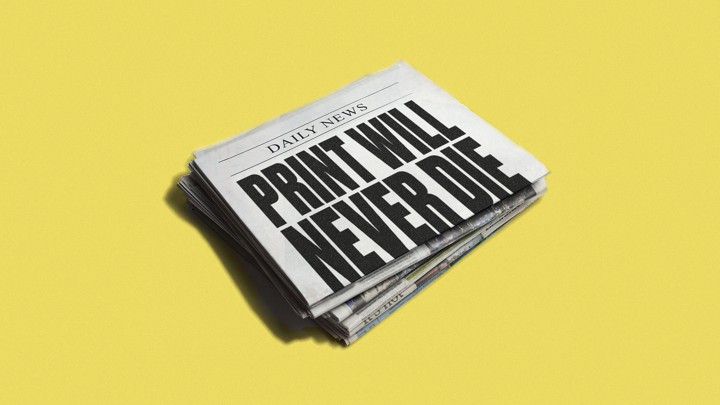
M. DYKSTRA / SHUTTERSTOCK / THE ATLANTIC
“A screen is many things all at once or in quick succession: The New York Times, Netflix, an auction house, a video of last summer’s vacation, a box of recipes, a text from a friend. The newspaper contains multitudes, but in the end, it is only itself. The well-wired mind knows that the screen, as a medium for news, is truer to real life because it brings us life in what we insist on calling ‘real time.’”
Clearly, Andrew Ferguson is one of us. Writing in The Atlantic, Ferguson riffs on his experiment of this past winter, when he used a paper check to subscribe to a print subscription offer (delivered by direct mail) to The Wall Street Journal. He was interested to know what he’d been missing (he had a former four-paper-a-day habit before he became an online reader.)
Ferguson writes the kind of story you just lean into … I can almost feel the chill around my own ankles when he describes traipsing down his front path in his slippers to get the morning delivery. He seems to revel in the fact that he has a physical paper again, as he settles into reading with pillows plumped and coffee in hand.
The physical act of reading, described in Ferguson’s elegant style, is compelling. Yet for me, the most persuasive argument for print is the mental connection.
“On my phone or my laptop, I am beckoned incessantly to click on one link or another or still another, boxes of irrelevant video appear and disappear, audio screeches out unbidden, ads scurry across the screen obstructing the paragraphs I’m trying to read,” Ferguson writes.
“Mysterious algorithms known only to the gremlins of Silicon Valley push me toward stories that the gremlins reckon must be of related interest, as though, having read a story about Trea Turner’s broken index finger, I will now be eager for a review of the latest developments in orthopedic surgery. But I’m not. My newspaper could never be so noisy or presumptuous. It holds still,” he continues.
Noisy and presumptuous … a perfect descriptor for the act of reading online. Our brains carom from one topic to the next, until we look up in a bit of a daze and think “what was I here for?”
“Time’s relativity (thanks, Einstein) means we should have some control over the pace with which the world, and the news, comes at us, since neither screen nor paper will ever do better than offer a simulacrum of real life,” Ferguson concludes. “My daily paper at the curb brings its own simulacrum in its unique way, its own fantasy of what the world is like. I relish reacquainting myself with it each morning, at least for as long as I can. Of course, when my day really begins and I peek at my phone or flip open my laptop, the illusion is destroyed and replaced by another, much more frenetic one—until it returns the next morning with the steaming cup and the plumped-up chair, with the world held in place so I can get a good look at it.”
It’s this – the simple, oh-so-human act of the relaxed, engaged experience – that makes me believe we will always have print in our lives in one form or another. We’d all just miss it too much if it went away.
